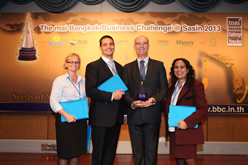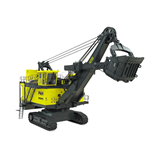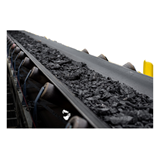The four team members who are completing an Executive Master of Business Administration (EMBA) at QUT developed the idea for a renewable energy business and their business plan as part of their higher degree.
They took their business plan to The mai Bangkok Business Challenge and took out first prize after pitting their business skills against 63 teams from 20 countries including the US who sent teams from UCLA, Rice University, Oregon and Miami.
QUT Graduate School of Business Corporate Educator Dr Peter Beven said winning His Majesty the King of Thailand's prize ensured significant business heads turned in QUT's direction.
"Competition judges who included leading Asian business figures, for example the Chair of Toshiba Asia, investment advisors and venture capitalists, were looking for business plans had that real market potential, that had the prospect of solving a current business problem, ie projects worth investing in," Dr Beven said.
"The QUT team's proposal to float solar-power cells on top of mine dams helps address two environmental problems faced by the mining industry - power use and evaporation - and created something of a 'light bulb' moment during the competition."
Team member, Daniel Marcus, said water was crucial to the operation of mines, some of which could cover several square kilometres.
"Rain water is collected and stored in mine dams but is often scarce at some locations so evaporation of water is a huge problem for mine operators during dry times," he said.
"Lack of water can force a mine to slow production or stop altogether resulting in financial loss, so anything that helps conserve this precious resource is going to be of huge benefit."
Team Member Ben Sharpe said the team came up with an idea for floating solar panels, different in design to those currently on the market, and developed a business plan accordingly.
He said the panels would help mines to reduce their carbon footprint and predicted a typical mine site could see a CO2 emissions reduction of 20,000 tonnes.
Marcus said the international enthusiasm and support the team received from top business professionals in Bangkok had encouraged them to refine their business plan with a view to taking the opportunity to the market.
"By developing this plan as part of our EMBA we were able to take a live problem and work with QUT and relevant industry professionals to develop what is considered to be a viable, marketable solution," he said.
Dr Beven said the team win was confirmation that QUT's strategy that all MBA and EMBA students undertake sponsored industry projects was achieving great results for students, the university and industry.
"As our students are postgraduates and in the main working within an industry, our coursework is solution focussed," Dr Beven said.
"Where students don't have a particular project in mind we match them with entrepreneurs and start-ups.
"By incorporating live spored projects, business challenges and opportunities directly into MBA and EMBA programs QUT is playing a role in helping to get new venture projects off the ground.
"In fact approximately half of the venture projects within our EMBA program have gone on to obtain funding and that's a success rate most university commercialisation companies would find difficult to match."





